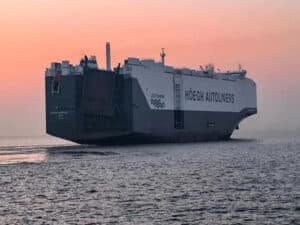
Japanese fishing company fined, banned from U.S. waters
Written by Nick Blenkey
The U.S. Department of Justice reports that Japanese fishing company Fukuichi Gyogyo Kabushiki Kaisha (Fukuichi), was convicted and sentenced today in the District of Guam for two violations of the Act to Prevent Pollution from Ships and one count of obstruction of an agency proceeding.
The charges stemmed from discharges of waste oil and oily bilge water from the vessel F/V Fukuichi Maru No. 112 into international waters and the attempt to cover up those discharges when the vessel was inspected by the U.S. Coast Guard in Apra Harbor, Guam.
The charges also included failing to properly document the discharge of fishing gear and plastics from the vessel, and obstructing a Coast Guard Port State Control inspection.
Fukuichi pleaded guilty to one count of obstruction of an agency proceeding, and two counts of violating the Act to Prevent Pollution from Ships.
The company was ordered to pay a $1.5 million criminal fine and serve a five-year term of probation, during which vessels owned and/or operated by the company will be banned from entering the Exclusive Economic Zone, Territorial Sea, or a port or terminal belonging to the United States without prior approval.
Fukuichi will also be required to implement a comprehensive Environmental Compliance Plan (ECP) that includes vessel audits. The ECP and associated audits must be sent to the nearest U.S. Coast Guard Captain of the Port prior to any of the company’s vessels entering U.S. waters or a U.S. port. The COTP will have the discretion whether to allow such entry based upon the company’s compliance with international and domestic laws governing pollution and safety.
The Justice Departmneyt says that Fukuichi was the owner and operator of the Fukuichi Maru No. 112 , which conducted fishing operations throughout the Pacific Ocean.
The vessel entered Apra Harbor, Guam, on April 1, 2019, for repairs to its cargo refrigeration system. According to court documents, members of the U.S. Coast Guard boarded the vessel and discovered fifteen pollution and safety deficiencies and detained it.
The inspectors discovered numerous leaks of water and oil into the bilges and the Chief Engineer confessed that the practice on the vessel was to discharge waste oil and oily bilge water directly into the ocean using an emergency bilge pump system and buckets. The inspectors discovered these systems coated with heavy oil.
The inspectors examined the vessel’s Oil Record Book and discovered two hundred and thirty-three incorrect or false entries.
Later during the inspection, the inspector discovered that the Chief Engineer obstructed their proceeding by erasing forty-two of the fraudulent or incorrect entries and replacing them with new information.
The inspectors also examined the vessel’s Garbage Record Book (GRB) and discovered that it contained a series of “ditto” marks instead of the signature of the officer in charge of managing the garbage.
The inspectors determined based on crew interviews that animal carcasses and fishing gear, which included plastic, had been discharged from the vessel and not record in the GRB.
“Fukuichi broke the law when the company intentionally discharged oily bilge waste into the ocean. To make matters worse, Fukuichi tried to cover up their unlawful acts by obstructing the routine Coast Guard inspection,” said Assistant Attorney General Jeffrey Bossert Clark for the Justice Department’s Environment and Natural Resources Division. “The Department will continue to work with its partners to ensure that companies, both foreign and domestic, comply with the rule of law.”
“I want to highlight the diligent work of the marine investigators who first identified these issues and worked closely with the vessel crew and the Department of Justice for several months to bring it to a conclusion,” said Capt. Christopher Chase, Captain of the Port Coast Guard Sector Guam. “Marine pollution prevention and response is a cooperative effort requiring the support of many partner agencies in order to hold those who violate international and U.S. law accountable for their actions. The preservation of the ecosystem here and throughout the Pacific is a top priority for the Coast Guard, and this case is one example of how we complete that mission.”
The case was investigated by U.S. Coast Guard Marine Safety Unit Guam, with assistance from the Coast Guard Investigative Service.




